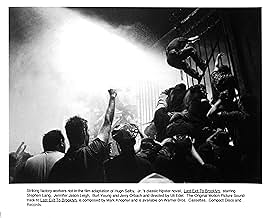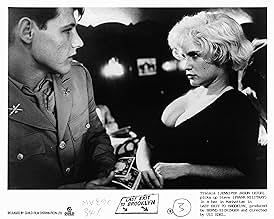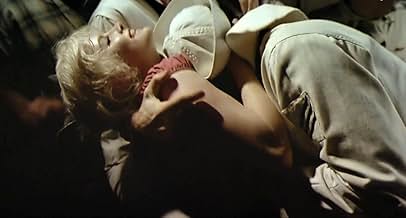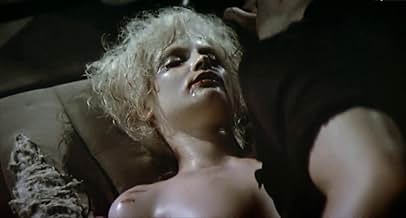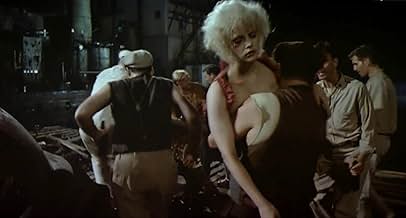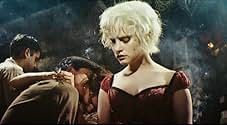IMDb RATING
6.8/10
7.5K
YOUR RATING
Set in Brooklyn during the 1950s against a backdrop of union corruption and violence. A prostitute falls in love with one of her customers. Also a disturbed man discovers that he is homosexu... Read allSet in Brooklyn during the 1950s against a backdrop of union corruption and violence. A prostitute falls in love with one of her customers. Also a disturbed man discovers that he is homosexual.Set in Brooklyn during the 1950s against a backdrop of union corruption and violence. A prostitute falls in love with one of her customers. Also a disturbed man discovers that he is homosexual.
- Director
- Writers
- Stars
- Awards
- 6 wins & 1 nomination total
Frank Acciarito
- Eddie
- (as Frank Acciarto)
- Director
- Writers
- All cast & crew
- Production, box office & more at IMDbPro
Featured reviews
Did you ever notice that if you were to show a film to after dinner friends, all too often what you bring out is a work that might not make a list of your personal top ten favorite movies? This is one of those films. Very postwar early 50's, but a 1950's Donna Reed would have been lost in. It truly is the opposite of Pleasantville.
Hubert Selby's dark vision of the common man is woven around several characters in a Brooklyn neighborhood. A factory worker called Big Joe is played by Burt Young. Instinctively brutal yet pathetically naive, he wanders through his Brooklyn neighborhood functioning at the most elemental level reinforced only by an inherited value system to which he is single-mindedly loyal. Jennifer Jason Leigh plays a whore whose timeline for thoughts of her future stretches out only several hours. She gets by in life rolling drunks whose tolerance for liquor is less than hers, or giving sex to those who outlast her. A soldier soon to be shipped out takes her to Manhattan for his last few stateside days and falls in love with her. Tralala (Leigh's character) recognizes the attendant lust but has no clue about the implications of his love. As she sees him off, the Lieutenant hands her an envelope. Tra's face lights up as her vision of the order in life (she gives him sex, he has a good time, he gives her money) seems to have been reaffirmed. When the envelope turns out to contain a lengthy love letter she doesn't become angry or disappointed, just confused.
In addition to Leigh and Young, powerful performances are turned in by Jerry Orbach (the corrupt union boss), Stephen Lang (the closet homosexual strike-line foreman), Stephen Baldwin (a street punk), Ricki Lake (Big Joe's very pregnant daughter), and Alexis Arquette (the teen-age transvestite).
The soundtrack is excellent and unobtrusive and Uli Edel's direction insightful. You need a strong stomach to watch it and quite a bit of dedication to find it, but it's well worth the effort.
Hubert Selby's dark vision of the common man is woven around several characters in a Brooklyn neighborhood. A factory worker called Big Joe is played by Burt Young. Instinctively brutal yet pathetically naive, he wanders through his Brooklyn neighborhood functioning at the most elemental level reinforced only by an inherited value system to which he is single-mindedly loyal. Jennifer Jason Leigh plays a whore whose timeline for thoughts of her future stretches out only several hours. She gets by in life rolling drunks whose tolerance for liquor is less than hers, or giving sex to those who outlast her. A soldier soon to be shipped out takes her to Manhattan for his last few stateside days and falls in love with her. Tralala (Leigh's character) recognizes the attendant lust but has no clue about the implications of his love. As she sees him off, the Lieutenant hands her an envelope. Tra's face lights up as her vision of the order in life (she gives him sex, he has a good time, he gives her money) seems to have been reaffirmed. When the envelope turns out to contain a lengthy love letter she doesn't become angry or disappointed, just confused.
In addition to Leigh and Young, powerful performances are turned in by Jerry Orbach (the corrupt union boss), Stephen Lang (the closet homosexual strike-line foreman), Stephen Baldwin (a street punk), Ricki Lake (Big Joe's very pregnant daughter), and Alexis Arquette (the teen-age transvestite).
The soundtrack is excellent and unobtrusive and Uli Edel's direction insightful. You need a strong stomach to watch it and quite a bit of dedication to find it, but it's well worth the effort.
This is one of the best scripts EVER written...pure and simple. The idea of a story, where it operates completely on a subtextural level, forming an overall landscape of sin and redemption without the characters themselves even realizing it, is off the scale. People who say this film is meaningless probably wear tee-shirts with Meg Ryan's picture on the front. I'm not knocking Meg Ryan or the person wearing the shirt...it's just a connection. I also don't agree that the story has no ending. It has a wonderful ending. Seeing Tralala, after what she just put herself through, finally respond to someone's genuine compassion, is a remarkable thing. The story operates on the same level as many Selby stories do, of characters so devoid of faith or hope that they don't recognize how close they are to having what they want or just appreciating the potential in what they have, and that mistake causes their undoing (in Stephen Lang's case) or their uncovered possibilities of grace (Jennifer Jason Leigh). In the end a new life (Burt Young's grandson) is brought into the world, and a new family formed by people who did recognize and do the right thing moves forward in the world. It's majestic.
In 1952, a panoramic view of the other side of North America is presented through the life of different characters and their dramatic stories, having Brooklyn in common. Tralala (Jennifer Jason Leigh) is a prostitute, connected with a violent street gang composed of small time crooks. They swindle most of Tralala clients, stealing their money. She meets a young lieutenant from Idaho, who falls in love with her. The labor union is on strike against the employers, placing picket against the trucks and protesting in front of the factory. American soldiers are again fighting in another war, this time against Korea. Maybe the only missing point in this film is the declared racism of those times. This sad, depressive and violent movie is another great work of Uli Edel, mainly known by `Christiane F'. The cast has amazingly performances, and the scene when Tralala is raped by dozens of men in an abandoned car is one of the most strong I have ever seen in a movie. I agree with the words of IMDB User Comments: `Great film, but not a piece of entertainment'. My vote is eight.
Title (Brazil): `Noites Violentas no Brooklin' (`Violent Nights in the Brooklyn')
Title (Brazil): `Noites Violentas no Brooklin' (`Violent Nights in the Brooklyn')
Last Exit to Brooklyn (1989) is based on the book by Hubert Selby Jr. about a group of working class during a labour strike in early 1950's in the gritty streets of Brooklyn. German Uli Edel directed this and Desmond Nakano wrote the screenplay. Stephen Lang plays Harry Black, the leader of the strike unit and Jennifer Jason Leigh is Tralala, a lost soul who works as a hooker for the various soldiers and other drunken males that use the services of the hookers drinking beer and acting dirty. The film explores the forms of love and how desperate we are for it, because living without it is not too easy or even possible as it belongs to being a human being.
The film opens with a line from the Bible which thickens the theme of the film and the above thing I wrote. Soon we get introduced to the main characters who don't seem to be too happy. Harry doesn't care about his wife and child but seems to be very attracted by a sensual and very attractive transvestite who lives with other transvestites in their own apartment while the "straight" prostitutes are mainly in the streets. This relationship between Harry and the transvestite(s) is very great and emotional and depicts the nature of love and caring as it doesn't always involve just different sexes together. Just watching Harry's eyes when he first sees his new interest in the street shows how powerful cinema can be without one single word.
Another important character is of course Tralala and she is also involved in the film's harrowing and almost unbearably sadistic and ugly end scene that finally (or what happens after that) makes the film a very strong experience. She is completely lost even though she meets a nice sailor who truly falls in love with her even though Tralala doesn't understand it at once. She understands it during the end scene as well as the meaning of the crying boy she first gets to meet during the act. Last Exit to Brooklyn explores love and caring between human beings and how strong it can be. Tralala wouldn't survive without the motorcycle boy, or she would live the rest of her life in pure emptiness and void.
The film handles also violence and weak human nature desperate for sex and other of his instincts. The violence is very harsh and off putting and the film's view of life is dark to say the least. Violence is here as unjustified and brutal as in real life, too, and maybe that's why so many seem to dislike the film and its honesty saying it is "unpleasant and repellent".
The sets are very impressive and the atmosphere in this film is all the time like the actors could any minute start singing and dancing their lines! This creates also a very strong feel of danger and "clock ticking" as the workers and strikers wait for the decision by the authorities and it is like it is night all the time. The film feels like a depiction of the world's last day that still may not be the last but no one knows it yet for sure.
Equally great with the photography and sets is the music by Mark Knopfler. The beautiful theme is played during the film restrainedly and it makes the strong events and situations even stronger, as always a great soundtrack does. The very conclusion is pretty optimistic and again the music makes it look even brighter and hopeful. Some characters didn't manage to learn before it was too late, but at least those who did have a chance for a better tomorrow.
The major negative sides in the film are in the occasional restlessness as the writer tried to give us more information than it was necessary. I mean mostly the scenes involving Burt Young character's family tragedy with all its screaming and shouting and crying. These scenes are not too powerful but more irritating as they could have been different. The characters' motivations are not always clear and sometimes they seem to develop too fast. What they tried to express through screaming and horrible noise should have been done more aesthetically and with the tools of the art and much more effectively.
Last Exit to Brooklyn is a powerful, challenging and at the end, beautiful film about the most important and universal things in life and about humanity, and it is also a great film visually. This is very powerful drama and only few steps from being a nearly perfect masterpiece. 8/10
The film opens with a line from the Bible which thickens the theme of the film and the above thing I wrote. Soon we get introduced to the main characters who don't seem to be too happy. Harry doesn't care about his wife and child but seems to be very attracted by a sensual and very attractive transvestite who lives with other transvestites in their own apartment while the "straight" prostitutes are mainly in the streets. This relationship between Harry and the transvestite(s) is very great and emotional and depicts the nature of love and caring as it doesn't always involve just different sexes together. Just watching Harry's eyes when he first sees his new interest in the street shows how powerful cinema can be without one single word.
Another important character is of course Tralala and she is also involved in the film's harrowing and almost unbearably sadistic and ugly end scene that finally (or what happens after that) makes the film a very strong experience. She is completely lost even though she meets a nice sailor who truly falls in love with her even though Tralala doesn't understand it at once. She understands it during the end scene as well as the meaning of the crying boy she first gets to meet during the act. Last Exit to Brooklyn explores love and caring between human beings and how strong it can be. Tralala wouldn't survive without the motorcycle boy, or she would live the rest of her life in pure emptiness and void.
The film handles also violence and weak human nature desperate for sex and other of his instincts. The violence is very harsh and off putting and the film's view of life is dark to say the least. Violence is here as unjustified and brutal as in real life, too, and maybe that's why so many seem to dislike the film and its honesty saying it is "unpleasant and repellent".
The sets are very impressive and the atmosphere in this film is all the time like the actors could any minute start singing and dancing their lines! This creates also a very strong feel of danger and "clock ticking" as the workers and strikers wait for the decision by the authorities and it is like it is night all the time. The film feels like a depiction of the world's last day that still may not be the last but no one knows it yet for sure.
Equally great with the photography and sets is the music by Mark Knopfler. The beautiful theme is played during the film restrainedly and it makes the strong events and situations even stronger, as always a great soundtrack does. The very conclusion is pretty optimistic and again the music makes it look even brighter and hopeful. Some characters didn't manage to learn before it was too late, but at least those who did have a chance for a better tomorrow.
The major negative sides in the film are in the occasional restlessness as the writer tried to give us more information than it was necessary. I mean mostly the scenes involving Burt Young character's family tragedy with all its screaming and shouting and crying. These scenes are not too powerful but more irritating as they could have been different. The characters' motivations are not always clear and sometimes they seem to develop too fast. What they tried to express through screaming and horrible noise should have been done more aesthetically and with the tools of the art and much more effectively.
Last Exit to Brooklyn is a powerful, challenging and at the end, beautiful film about the most important and universal things in life and about humanity, and it is also a great film visually. This is very powerful drama and only few steps from being a nearly perfect masterpiece. 8/10
After being blown away by the film version of Requiem for a Dream, I recently began reading some of Selby's books. I started with The Room and moved on to Last Exit to Brooklyn. Tonight I watched the film.
I think it's very unfortunate that people have criticized it here for exactly the qualities that make it unique compared to most American films. Yes, it's dark, and yes, there are not always clear resolutions to every character's part of the story. Those are qualities present in Selby's book and it would have been a shame for the filmmakers to abandon them, just as it would have been a shame for Aronofsky to cave to the pressures to find a happier ending for his film of Requiem...
As a reader of the book I think those negative comments are even more misguided, because the screenwriter did quite a bit to try to make the material more accessible for the viewing audience. He intertwined what are essentially separate stories (the book is more like a collection of short stories around related themes than a traditional novel), and found what was probably the happiest ending possible given the material. The book doesn't end on the relief of the end of the strike, but finishes with an amazing coda that contains characters like Abraham, a man who spends money on clothes and his car but won't cough up to buy vitamins for his malnourished children.
My one big complaint about the screenplay was the treatment of Harry Black's character. In the book he is a largely ineffectual blowhard who is laughed at by almost everyone around him, but in the film he is almost heroic at times, leaping into the middle of the confrontation at the picket line. I think his descent is more credible in the book, but Selby was also able to get inside Harry's head on paper in a way that's difficult to translate into film.
Overall I think this film is a very excellent adaptation of extremely difficult material, and I recommend it to anyone who is willing to watch a story about the pain and suffering that happens in everyday life without the Hollywood gloss.
I think it's very unfortunate that people have criticized it here for exactly the qualities that make it unique compared to most American films. Yes, it's dark, and yes, there are not always clear resolutions to every character's part of the story. Those are qualities present in Selby's book and it would have been a shame for the filmmakers to abandon them, just as it would have been a shame for Aronofsky to cave to the pressures to find a happier ending for his film of Requiem...
As a reader of the book I think those negative comments are even more misguided, because the screenwriter did quite a bit to try to make the material more accessible for the viewing audience. He intertwined what are essentially separate stories (the book is more like a collection of short stories around related themes than a traditional novel), and found what was probably the happiest ending possible given the material. The book doesn't end on the relief of the end of the strike, but finishes with an amazing coda that contains characters like Abraham, a man who spends money on clothes and his car but won't cough up to buy vitamins for his malnourished children.
My one big complaint about the screenplay was the treatment of Harry Black's character. In the book he is a largely ineffectual blowhard who is laughed at by almost everyone around him, but in the film he is almost heroic at times, leaping into the middle of the confrontation at the picket line. I think his descent is more credible in the book, but Selby was also able to get inside Harry's head on paper in a way that's difficult to translate into film.
Overall I think this film is a very excellent adaptation of extremely difficult material, and I recommend it to anyone who is willing to watch a story about the pain and suffering that happens in everyday life without the Hollywood gloss.
Did you know
- TriviaRalph Bakshi had made a previous attempt to direct the film, a production he was to co-produce with Steve Krantz and author Hubert Selby Jr. Actor Robert De Niro accepted a major role in the film. However, the project fell apart when Bakshi and Krantz had a falling out. Bakshi and Selby became friends, and, according to Bakshi, they "tried a few other screenplays after that on other subjects, but I could not shake Last Exit from my mind."
- SoundtracksBe Ba-ba Le-ba
Written and Performed by Helen Humes
Courtesy of CEMA Special Markets/EMI Records, Inc.
- How long is Last Exit to Brooklyn?Powered by Alexa
Details
- Release date
- Countries of origin
- Language
- Also known as
- Letzte Ausfahrt Brooklyn
- Filming locations
- Production companies
- See more company credits at IMDbPro
Box office
- Gross US & Canada
- $1,730,005
- Opening weekend US & Canada
- $186,489
- May 6, 1990
- Gross worldwide
- $1,730,005
- Runtime
- 1h 42m(102 min)
- Color
- Aspect ratio
- 1.85 : 1
Contribute to this page
Suggest an edit or add missing content


